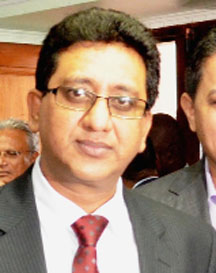Attorney General Anil Nandlall has announced that a plan to advance the justice sector has been prepared, focusing on institutional strengthening, particularly reducing the backlog of cases pending by “bringing greater dispatch” to the judicial system.
Resources will be made available to strengthen the institutional capacity and capability of the judicial system at every level, to partner with it in implementing initiatives designed to increase efficiency, address the backlog of cases and ensure timely delivery of decisions, a statement from the Attorney General’s Chambers said on the PPP/C’s plans should it win the upcoming general election.
The 13-point document said measures would be implemented to continue to enhance the human resources base of the justice system by the appointment of more judges, magistrates and other personnel. The statutory complement of High Court judges has already been increased from 12 to 20, paving the foundation for more appointments to be made, he said. Steps will also be taken to ensure more frequent sittings of the magistrates’ court, particularly in rural and hinterland communities where new courts under construction will include accommodations for magistrates to foster longer stints in those areas.

The statement also said that once the new rules have been endorsed, the Judicial Review Act will become operational. This “ground breaking legislative intervention” will provide citizens with “an unprecedented repertory of legal remedies” which they can employ to seek redress from officials of the state, government and every public officer or organ whenever there is an actual or perceived violation of the Constitution, misbehaviour, abuse of authority or wrongful or unreasonable exercise of power. In addition, the Commercial/Land Registry in Georgetown will be relocated to a new site on Avenue of the Republic (the old NBS building) within the next two weeks while the Land Registry in Berbice will move into its new accommodations at Main Street, New Amsterdam.
Other measures noted in the plan are the installation and operationalisation of a modern voice recording system at the Court of Appeal and in the High Court in Demerara, New Amsterdam, Berbice and Suddie, Essequibo. A new mediation centre will also be established in Essequibo to complement centres already in operation in Georgetown and New Amsterdam, Berbice.
Staff is currently being recruited for the Family Court. This specialised court will deal with family matters such as divorces, disputes in relation to matrimonial property, adoption, guardianship, access and custody and maintenance of children.
The new civil procedure rules will soon be brought into force which will “revolutionize and indeed completely modernize” civil litigation to bring Guyana on par with other jurisdictions in the Caribbean and elsewhere.
According to the proposal, the requisite resources will be provided to ensure that the justice system remains accessible and user friendly and rehabilitative work has been done on dilapidated court houses and new ones have been built to facilitate this process. A new magistrate’s court with residential quarters and a sub-magisterial district office will be commissioned in Lethem within the next few weeks.
In this regard, two contracts have been awarded for the construction of two magistrates’ court at Sparendaam, East Coast Demerara along with a new edifice in the Supreme Court compound in Georgetown that will accommodate two land courts with judge’s chambers and registries.
The attorney general’s office has also pledged to continue to consult with the Bar association and other organizations as it charts a course to advance the justice system that is “truly competent, impartial, efficient, accessible.” The document also includes enactment of a series of new legislation including a Bail Act, A Jury’s Act, An E-Transaction Act, a new Arbitration Act, a Hire Purchase Act, a Whistle Blower Protection Act, an Electronic Communications and an Transactions Act, a Juvenile Act, a Motor Vehicles Insurance (third party risks) Amendment Act and Amendments to the Anti-Money Laundering and Countering the Financing of Terrorism (AML/CFT) Act.




